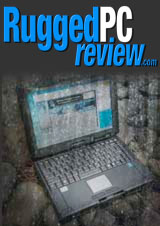HydroChem Industrial Services, Inc. is a provider of industrial cleaning services with offices throughout the United States. HydroChem provides specialized hydroblasting, chemical cleaning, ultra-high pressure cleaning, vacuum services and tank cleaning. HydroChem's customers include petrochemical, oil refining, electric utility and pulp and paper industries. Historically, HydroChem's crew leaders (job foremen) manually completed pre-printed service receipts on the customer's job site. These forms document equipment, labor and materials were then used in performing the work. After receiving customer signature approval, the service receipt serves as the source document for invoicing and payroll data entry.
 HydroChem's challenge was twofold. First, the task of completing an accurate service receipt on the job site was a challenge due to the complexities and variations in customer contracts, and different crew leaders performing work in different plants for various customers. Secondly, HydroChem was and is continuously looking for ways to improve the efficiencies of processing data, seeking benefits for both themselves and their customers. "By being able to generate a service receipt per the customer contract and then generate a matching invoice more efficiently, we can improve customer satisfaction tremendously," said Michael Flaherty, MIS Director.
HydroChem's challenge was twofold. First, the task of completing an accurate service receipt on the job site was a challenge due to the complexities and variations in customer contracts, and different crew leaders performing work in different plants for various customers. Secondly, HydroChem was and is continuously looking for ways to improve the efficiencies of processing data, seeking benefits for both themselves and their customers. "By being able to generate a service receipt per the customer contract and then generate a matching invoice more efficiently, we can improve customer satisfaction tremendously," said Michael Flaherty, MIS Director.
HydroChem determined that a tool was needed to allow their crew leaders to generate a service receipt on the job site and then automate the process of getting the data into their billing and payroll systems. Based upon the challenges presented by the working environment and the vast amount of data collected, it was concluded that using PDAs would not be effective. HydroChem needed a sturdier device with a larger screen and broader features, and so they turned their attention to a tablet solution.
Since their customer base consisted of petrochemical companies, oil refineries, electric utilities and paper mills, the hardware platform HydroChem chose had to meet certain technical and environmental requirements. Ruggedization and durability were key factors, as well as the hazardous location rating. HydroChem needed hardware that was certified for a hazardous location. The Xplore iX104 has a UL-1604, Class 1 Division 2 rating for hazardous locations. This means the tablet will not emit a spark if used in a flammable environment where volatile gases may be present.
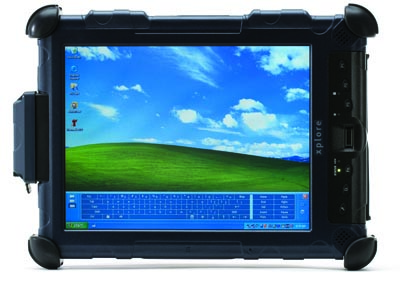 The Xplore Tablet PC was also able to survive tremendous physical punishment from the crew leaders, including drops and impacts. "The crew leaders appreciated the fact that the iX104 is a sealed unit, enabling it to withstand a variety of unfavorable elements including dust, rain, sleet and mud," said Hartman.
The Xplore Tablet PC was also able to survive tremendous physical punishment from the crew leaders, including drops and impacts. "The crew leaders appreciated the fact that the iX104 is a sealed unit, enabling it to withstand a variety of unfavorable elements including dust, rain, sleet and mud," said Hartman.
The rugged tablets were then deployed in a variety of HydroChem locations across the United States. The temperature specifications (includding a very wide operating temperature range of -4 to 140 degrees Fahrenheit) guaranteed performance in the extreme environments from the Texas heat to the Minnesota cold.
Another deciding factor for HydroChem's choice was their need for a display screen that is legible in both low light conditions and bright sunlight. Lastly, the iX104 is impermeable to salt fog exposure, which is essential when servicing customers in coastal areas such as Corpus Christi, Texas.
Today, HydroChem's service receipts are electronically stored on the Xplore tablets. While HydroChem crew leaders are on site, they collect the operational data for the service receipt on the iX104. When the job is complete, the crew leader prints out the service receipt for customer approval.
Field Service: Minnesota Department of Natural Resources' Division of Fish and Wildlife (March 2007)
Receiving recognition for its innovative use of technology, Minnesota Department of Natural Resources' Division of Fish and Wildlife won the 2006 Minnesota Government IT award for developing and implementing a robust mobile Fisheries Lake Survey system using Xplore X104C2 rugged tablets.
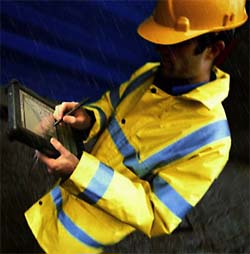 Before implementing the rugged Tablet PCs, the survey system required handwritten information on paper forms to be retyped in offices across Minnesota. Dozens of fisheries area databases were methodically analyzed for errors and consolidated in a process that took months every year.
Before implementing the rugged Tablet PCs, the survey system required handwritten information on paper forms to be retyped in offices across Minnesota. Dozens of fisheries area databases were methodically analyzed for errors and consolidated in a process that took months every year.
Rick Lorenzen, Fisheries IT Supervisor at the Minnesota Department of Natural Resources, knew a technological advancement was necessary. For three years, more than 40 people worked on the project to define the requirements, select the hardware, determine appropriate data validation values, design and load the database, develop the entry screens, and rigorously test screens and reports.
Seven hardware testers evaluated over a dozen potential field hardware options, ultimately choosing Xplore rugged tablets.
The use of Xplore X104C2 rugged tablets in survey boats permitted data entry to be validated with fish in hand, eliminating redundant data entry and reducing errors. Immediate validation of data at the point of capture also ensured more accurate data for the Department of Natural Resources.
"The application of technology significantly improved efficiency while capturing fisheries data, speed of data retrieval, and quality of data stored," Lorenzen said in his Lake Survey Project. "It also enhanced the ability to share the data with the public and other agencies."
"The new Java client Lake Survey application is delivered to rugged tablets and desktop workstations over the DNR intranet and provides statewide access to a single database and dozens of reports," Lorenzen said. "Data captured, stored, and analyzed by this system includes current and historic physical, chemical, and biological information regarding habitat, water quality, and fish population characteristics. This information is used to manage Minnesota's fisheries."
Other data, such as data from Minnesota's largest lakes, was also made available in the new data structure design, providing a wealth of additional research possibilities for research biologists and other agencies as well.
In addition to making information more readily available, the tablets have also increased efficiency and improved quality for the department.
The rugged tablets have eliminated 27 separate copies of lake survey databases that previously required weeks of data consolidation annually. They also have ensured better data quality by providing validation when the fish is still in-hand instead of doing the data entry from paper over the winter when the fish was no longer available to recheck.
"They provide immediate reporting once the data is entered," Lorenzen said. "Previously, reports were only published once a year after winter data entry and after consolidation of multiple databases."
The measurable benefits were proven by cost savings of implementing the rugged tablets. Since data entry occurs directly onto the rugged tablets while in the field, approximately 8,875 hours of in-office data entry were eliminated. These hours saved the department $195,250 annually. Overall, estimated cost benefits from implementing the application were $216,170 each year.
Not only did the rugged tablets save the department money, they also saved employees hours of memorization.
"The tablets provide intuitive screens with complete drop-down selection values that shortened the data entry learning curve for staff and eliminated the need to memorize 3 digit codes for dozens of fish and plant species," Lorenzen said.
Field Service: NASA has the Spirit to 'Xplore', with Vibtech's help!
Rugged Tablet PCs are an ideal, portable solution for many applications that take place in harsh or demanding environments. When Scottish engineering company Vibtech was called upon to help NASA (National Aeronautics and Space Administration) recently, it needed an effective tool for use with its land seismic data acquisition systems. Vibtech chose an Xplore Tablet PC, supplied by Spirit Data Capture Limited.
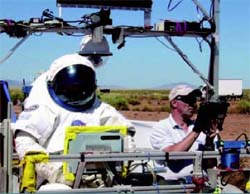 Vibtech (Vibration Technology Limited) is based near Edinburgh, and specializes in the development of wireless solutions for the oil, gas and mineral exploration sectors. These include a totally new seismic acquisition system and the Infinite Telemetry System. The company has recently been working on programs with NASA in the US. These have included a project that could eventually lead to the development of a seismic data acquisition system that could be sent to the moon - and possibly even to Mars.
Vibtech (Vibration Technology Limited) is based near Edinburgh, and specializes in the development of wireless solutions for the oil, gas and mineral exploration sectors. These include a totally new seismic acquisition system and the Infinite Telemetry System. The company has recently been working on programs with NASA in the US. These have included a project that could eventually lead to the development of a seismic data acquisition system that could be sent to the moon - and possibly even to Mars.
As part of this program, Vibtech needed a powerful and rugged Tablet PC that had a screen input. This would act as the Central Control Unit (CCU) in the new system, and would be used in a range of different scenarios. Steve Wilcox, Vibtech's Technical Manager, explains: "We needed a tablet that was PC-compatible and had the performance of a PC, but was light, rugged and had a good battery life. We started trawling the web and ultimately found what we were looking for on Spirit's website." Spirit is the authorized channel partner for Xplore Technologies, a leading supplier of rugged tablet PCs. Steve continues: "The Xplore iX104C2 appeared to offer the best combination of features, and met our key requirements."
The Xplore tablet has already been used by Vibtech in simple two dimensional subsurface imaging in support of NASA's developing planetary exploration program. However, Steve Wilcox envisages several other scenarios in which the tablet could be used in the future. He says: "We are thinking of using
it as a CCU in different ways, including being mounted in a quad bike or all terrain vehicle. We are also exploring the possibility of using it as a data collection device in applications where data are stored in remote acquisition
units, rather than being transmitted back to the CCU."
The first scenario is as the CCU and data storage unit for a small, one-man demonstration system that could be used for astronaut training. The second involves a similar use, but for civil engineering applications of seismic imaging. These would allow civil engineers to conduct surveys of the ground structure in a specific area prior to the start of building work. In the third
scenario, the Xplore tablet could be used as the CCU for a passive monitoring system used on oilfield production sites. This would enable engineers to try and determine the changes occurring to sub-surface structures as a result of production procedures.
Steve Wilcox continues: "The Xplore tablet allows us to offer NASA and other organizations a simple, one-man operable system at a relatively low cost. We particularly like its portability and its long battery life. The unit has performed exceptionally well, and has enabled us to look at areas of business that we hadn't previously considered."
Defense: Xplore's Rugged Tablet PC's Meet Emerging Defense Training Challenges
Saab Training Systems develops world-leading systems and services for military training. The company offers a total concept with reliable systems that through their realism and precision create optimum conditions for soldiers and officers to improve their abilities in a cost effective way. Today the company employs around 400 people. Its subsidiaries are located in the USA, UK, Germany, Norway, Finland, the Netherlands and Canada and almost 95% of its profitability
is reflected in exports to nearly 20 countries.
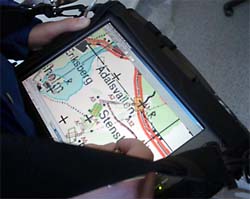 Tactical training is the most complex of the different categories Saab Training Systems offers. The key element in tactical training is that the entire training session is recorded on a computer. Saab Training Systems began its operations in 1975. Prior to that time, a computer-aided recording method was utilized. The training session was supervised and evaluated based on the training commander's observations. A few years ago, the first vehicle mounted computers were deployed, followed by rugged Tablet PC's, which are mainly used out in the field. "Before we found Xplore's rugged tablet, we tested various devices, which looked good on paper, but failed in reality. It was a challenge to find a truly ruggedized tablet", Erik Nilsson, the project manager from Saab Training Systems explains. "In addition to surviving in rigorous conditions, we also require fast data processing capabilities to run our complex software smoothly on the system. It's the combination of robustness and power that Saab and our customers demand from the mobile computing solution," Nilsson continues.
Tactical training is the most complex of the different categories Saab Training Systems offers. The key element in tactical training is that the entire training session is recorded on a computer. Saab Training Systems began its operations in 1975. Prior to that time, a computer-aided recording method was utilized. The training session was supervised and evaluated based on the training commander's observations. A few years ago, the first vehicle mounted computers were deployed, followed by rugged Tablet PC's, which are mainly used out in the field. "Before we found Xplore's rugged tablet, we tested various devices, which looked good on paper, but failed in reality. It was a challenge to find a truly ruggedized tablet", Erik Nilsson, the project manager from Saab Training Systems explains. "In addition to surviving in rigorous conditions, we also require fast data processing capabilities to run our complex software smoothly on the system. It's the combination of robustness and power that Saab and our customers demand from the mobile computing solution," Nilsson continues.
Each soldier, who participates in the training session wears a vest, which has small loudspeakers, radio antenna and built-in GPS. Additionally, the helmet has integrated laser detectors and reflectors. The GPS sends location information via a radio network to the tablet and the commander, who is the primary
user of the Tablet PC. The commander can supervise the movements of the troops and give commands to soldiers, which are communicated via the Saab-developed Radio Communication System architecture called DAN (data acquisition network). Regular wLAN does not meet the required data transfer rates and GPRS is too slow for this purpose. In addition to the real-time supervision on the field, the entire training session is recorded on the tablet and used for a post maneuvers review. For the feed-back session, the recorded training data is often screened on a large canvas, as the size of the exercise session can be anything from platoon level through brigade combat team size - between ten to a thousand
participants. The supervisor can monitor the geographic position of the troops from the tablet.
Xplore's iX104C2 tablets are mainly used by the supervisor of the training session, who is typically on the field close to the troops. Training sessions are conducted in various weather conditions, which can vary considerably. In Scandinavian countries, where Saab Training Systems and its customers currently
deploy Xplore tablets as part of the combat training systems, the temperature can reach +30 degrees Celsius in a sunny summer day while in winter it can drop down to -20 degrees Celsius. "The operating temperature range for the tablet was also a deciding factor for us, when we selected the best computing solution for Saab," Nilsson stated, emphasizing the importance of this environmental factor. Xplore's iX104C2 tablets have no problem surviving in extreme temperatures, since the tablets can be used at temperatures between -20 and +60 degrees Celsius. Additionally the AllVue display that is readable in bright sunshine is ideal for outdoor use.
Another important feature is the battery life time. Nilsson clarifies: "A training session can last half an hour, a whole day or any time between that. The major purpose that rugged tablets are used is to record the training data and also to communicate during the training session. Therefore we need reliable, long-lasting batteries to be able to work on the field."
To take full advantage of the Xplore tablet, Saab Training Systems has programmed the most common functions needed when using their software behind the programmable function keys on the keypad of the tablet. The user can switch between a map view, which shows the location data of each soldier and vehicle participating in the training session, and a task panel view, which shows messages communicated between each participant and the commander. Another
function button is programmed for magnifying, thereby enabling the user to enlarge the selected area of the map.
Two function buttons on the keypad have been programmed to zoom the display and to switch between the map view and task panel view.
As the training systems become more complex and advanced, the need for rugged, durable and sophisticated equipment grows exponentially. In addition to defense and military training, there are other user groups for similar types of systems such as the public safety sector. Xplore's rugged Tablet PC systems are powerful solutions ready for future expansion whether it's for a more versatile software application or another harsh environment!
Transportation: Xplore Rugged Tablet PCs Sweeten the Pot for U.S. Sugar Corporation
When Hurricane Wilma struck South Florida in the fall of 2005, United States Sugar Corporation (U.S. Sugar) took a direct hit. Not only were many of its employees left homeless, but the company's refineries experienced significant physical damage at the beginning of the harvesting season.
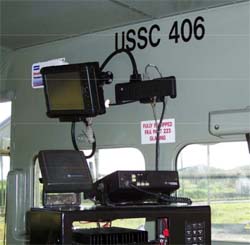 Worse, U.S. Sugar's proprietary railroad, its critical lifeline to the thousands of acres of sugar cane that grow between Lake Okeechobee and the Florida Everglades, was damaged when the storm's high winds reportedly pushed over some railcars. Fortunately, U.S. Sugar, one of America's premier privately held agribusiness companies, was able to make up for lost ground in a hurry.
Worse, U.S. Sugar's proprietary railroad, its critical lifeline to the thousands of acres of sugar cane that grow between Lake Okeechobee and the Florida Everglades, was damaged when the storm's high winds reportedly pushed over some railcars. Fortunately, U.S. Sugar, one of America's premier privately held agribusiness companies, was able to make up for lost ground in a hurry.
Once the repairs were made, U.S. Sugar announced plans to embrace advanced technologies, such as Xplore Corporation's rugged tablet PCs, as a way to improve the efficiencies of its railroad system. With the Xplore iX104 Tablet PC as the centerpiece, U.S. Sugar announced the creation of its "Full Throttle Innovation program."
The objective of the program "is to provide a real time comprehensive view of the entire U.S. Sugar cane network," said U.S. Sugar's Heather Banky. By pairing sophisticated applications with the industry's most durable tablet PC, the company was able to track when and where each car was loaded as well as its current status. "Railroad operations will use the information for day-
to-day logistics planning," Banky added. "This program will become the building block for future improvements."
The program's impact is significant because "in order to obtain the maximum amount of sugar yield from this freshly cut cane it must be moved from the fields to the processing mills within five hours," said George Haldane of Apogee Systems, Inc., a systems integrator that specializes in servicing the railroad industry, including the U.S. Sugar project. "It is the responsibility of this railroad to position empty cars along the sugar cane fields ready for filling and then move them along to the sugar cane
processing mills."
In years past, U.S. Sugar had used hand-written cards to track car movements during the harvest. These cards were filled out by the train crews in the field and then handed off at the mill to be completed by employees in various divisions.
However, with a remote reporting interface installed on the Xplore iX104 Tablet PC, virtually all car movement events are now captured in real-time in the field and then transmitted wirelessly to the railroad's central control center.
"Receiving this real-time data, the control center is able to communicate the locations of each car as well as direct them in a timely and efficient manner," added Haldane, whose company also installed a locomotive docking station for the Xplore iX104 and satellite data antenna on each locomotive. "With this program in place, U.S. Sugar has improved control over a large
area of its operations, has cut its data input cost to zero, and has reduced errors and lost data, allowing it to get the maximum, premium yield from their cane fields."
Utilities: Harnessing the Power of Xplore's Rugged Tablet PC's to Better Serve the Community (June 2005)
The company that would evolve into Huntsville Utilities was founded in 1823, as Huntsville Waterworks and was Alabama's first public water system. Over the years, the organization has grown and added new technologies and services to meet the demands of their flourishing community. Today, Huntsville Utilities
is comprised of three systems, Water, Gas and Electric, which share management, customer services, billing, meter reading, accounting and purchasing as a cost-effective benefit to its customers. The utility and its 500 employees serve a community of over 340,000 people by pumping 10.8 billion gallons of water, distributing 5.8 billion cubic feet of natural gas and supplying 4.7 billion kilowatt hours of electricity over 3,700 miles annually.
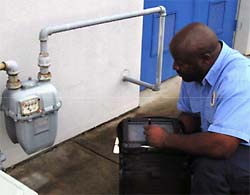 Over the long history of this organization, Huntsville Utilities has continually strived for excellence in the services that they provide and how those services are delivered to their community. Huntsville Utilities' water treatment plants have received the "Best Operated Surface Water Treatment Plant" Award 14 times combined. The ground water supply has received the "Best Operated Ground Water System in Alabama" 9 times since 1981. In 1992, the System received the EPA Safe Drinking Water Excellence Award, where Huntsville was selected over other large water suppliers in EPA Region IV, which includes 8 southeastern states. In 2004, the Gas Department was recognized by the Business Council of Alabama for its tenth year of No Lost-Time Accidents and the Lowest Accident Frequency Rate for the 26-50 vehicle groups. users complained about lengthy search time to access information and delays in booting up.
Over the long history of this organization, Huntsville Utilities has continually strived for excellence in the services that they provide and how those services are delivered to their community. Huntsville Utilities' water treatment plants have received the "Best Operated Surface Water Treatment Plant" Award 14 times combined. The ground water supply has received the "Best Operated Ground Water System in Alabama" 9 times since 1981. In 1992, the System received the EPA Safe Drinking Water Excellence Award, where Huntsville was selected over other large water suppliers in EPA Region IV, which includes 8 southeastern states. In 2004, the Gas Department was recognized by the Business Council of Alabama for its tenth year of No Lost-Time Accidents and the Lowest Accident Frequency Rate for the 26-50 vehicle groups. users complained about lengthy search time to access information and delays in booting up.
Huntsville Utilities recognized the value of technology some time ago and
computerized its maps in the 1980's. In 1995 they purchased handheld
computers for the Field Services section but the transition to computers was not adopted by the entire workforce. They continued to utilize paper forms and
maps for a significant amount of their tasks in addition to the computers that
they deployed at that time. By 2004 they were having functional and battery
problems operating the older computers, which were very slow and and starting to fail. Furthermore, the Huntsville Utilities
"We recognized the need to reduce reliance on paper forms, and began to search for better tools to more efficiently address our automation needs," stated Ron McLeroy, Technical Services Manager, Huntsville Utilities.
Huntsville Utilities was familiar with Tablet PCs and recognized the many benefits that automating existing business processes could achieve. They knew that a rugged product was needed that could withstand rough handling and decided that laptops were not a good solution as the clamshell set-up was fragile and the hinges were prone to breakage. A specific list of important performance criteria included a larger screen size to read and verify maps, the ability to utilize electronic forms and the capability to check meter numbers using an in-house developed program. In addition, they desired to develop a single program with multiple uses for different departments and crews in order to maximize their programming efforts and take advantage of ongoing mapping applications.
Based on their performance criteria and other requirements, Huntsville Utilities prepared a plan for identifying the rugged computer that would best serve their needs and the needs of their customers. They evaluated products from multiple vendors, including Xplore Technologies. The evaluation criteria focused in four major areas: product specification, readability in direct sunlight, field
technician feedback and durability.
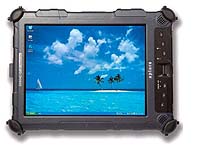 "There were many factors that influenced our decision to choose the Xplore iX104 Tablet PC. We liked the rugged characteristics. Our personnel conducted rigorous, in-depth product testing, and at one point we literally tossed the various products around our offices including multiple drop tests to hard surfaces," explained McLeroy. Huntsville Utilities also liked the speed of the iX104 and the functionality of the Tablet PC Operating System. They reviewed other hand-held devices but determined that the screens were too small to see necessary information and maps. In addition, they preferred the ease of writing a program once as opposed to creating and maintaining multiple programs for handhelds and computers with full windows operating systems.
"There were many factors that influenced our decision to choose the Xplore iX104 Tablet PC. We liked the rugged characteristics. Our personnel conducted rigorous, in-depth product testing, and at one point we literally tossed the various products around our offices including multiple drop tests to hard surfaces," explained McLeroy. Huntsville Utilities also liked the speed of the iX104 and the functionality of the Tablet PC Operating System. They reviewed other hand-held devices but determined that the screens were too small to see necessary information and maps. In addition, they preferred the ease of writing a program once as opposed to creating and maintaining multiple programs for handhelds and computers with full windows operating systems.
In late summer 2004, Huntsville Utilities deployed Xplore Technologies iX104 rugged Tablet PCs after working with an Xplore systems integrator.
Field service representatives are using the tablets to perform turn on's/turn off's and rereads for meters as well as class verifications. In addition, collections for outstanding payments are being performed with the Xplore tablets. Notations on electronic service tickets are also made and new
service tickets are downloaded by field service representatives using the tablets. Problems can be verified to determine if a full crew should be dispatched. Lastly, maps are installed on the tablet hard drives and field service representatives have access to a fully functional map viewing application, which shows GIS information such as distribution lines and enables them to get service area information. Each field operating section (Water, Gas and Electric) has mapping and maintenance applications running on computers which are being integrated with the Field Service applications so that sets, removes and routine maintenance can handled electronically with one common interface.
"The iX104 has been reliable and durable in the field and the field service representatives depend on it to perform their daily tasks. The long battery life enables the field service representatives to make more service calls, and information searches are also much faster. Electronic forms have been designed so that errors associated with entering information from paper are eliminated. The handwriting recognition feature functions well and reduces the field service representatives' reliance on paper. The systems have improved the speed and accuracy of inspections and meter sets, enabling our field service representatives to streamline their data collection and reporting
procedures," stated David Stair, Field Services Manager, Huntsville Utilities.

14000 Summit Drive, Suite 900
Austin, TX 78728, USA
Tel: (888) 449-7567
Fax: (512) 336-7791
Web: www.xploretech.com
